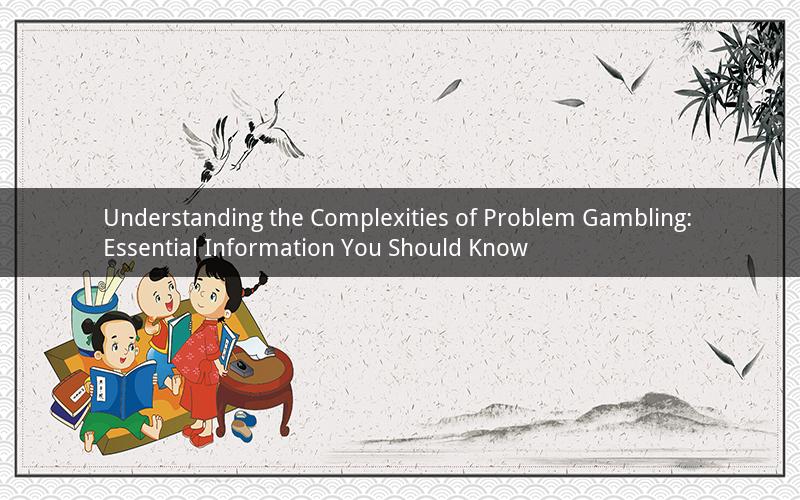
Introduction:
Problem gambling, also known as gambling addiction, is a serious issue that affects individuals, families, and communities. It involves excessive and uncontrollable gambling behavior that leads to negative consequences in various aspects of life. In this article, we will explore the essential information about problem gambling, including its definition, causes, symptoms, consequences, and available resources for support.
1. Definition of Problem Gambling:
Problem gambling refers to a gambling behavior that causes harm or distress to an individual. It encompasses a wide range of activities, such as playing slot machines, betting on sports, or engaging in online gambling. Problem gambling can manifest in different forms, including pathological gambling, problem gambling, and gambling disorder.
2. Causes of Problem Gambling:
The causes of problem gambling are multifaceted and can include various factors. Some common causes include:
a. Genetic predisposition: Research suggests that genetics may play a role in the development of gambling addiction. Individuals with a family history of gambling problems are at a higher risk of developing the same issue.
b. Psychological factors: Certain personality traits, such as impulsivity and sensation-seeking, can contribute to the development of problem gambling. Additionally, individuals with depression, anxiety, or other mental health issues may turn to gambling as a form of self-medication.
c. Social factors: Peer pressure, social influence, and the availability of gambling opportunities can increase the likelihood of problem gambling. Factors such as living in a community with a high prevalence of gambling or having friends who engage in excessive gambling behavior can also contribute to the problem.
3. Symptoms of Problem Gambling:
Identifying problem gambling can be challenging, as symptoms may vary from person to person. Some common symptoms include:
a. Preoccupation with gambling: Individuals with problem gambling may constantly think about gambling, plan their next gambling session, or relive past gambling experiences.
b. Loss of control: Despite efforts to control gambling behavior, individuals with problem gambling often find it difficult to stop or limit their gambling activities.
c. Financial difficulties: Problem gambling can lead to significant financial problems, including debt, lost income, and financial instability.
d. Emotional and psychological consequences: Problem gambling can result in increased stress, anxiety, depression, and strained relationships with family and friends.
4. Consequences of Problem Gambling:
Problem gambling can have severe consequences, impacting various aspects of an individual's life. Some of the common consequences include:
a. Financial consequences: Problem gambling can lead to significant financial loss, including debts, bankruptcy, and the loss of assets.
b. Emotional and psychological consequences: Problem gambling can cause feelings of guilt, shame, and despair, leading to mental health issues such as depression, anxiety, and substance abuse.
c. Social and relational consequences: Problem gambling can strain relationships with family and friends, leading to isolation and social isolation.
d. Legal consequences: In some cases, problem gambling may lead to illegal activities, such as theft or fraud, to fund gambling habits.
5. Resources for Support:
If you or someone you know is struggling with problem gambling, it is crucial to seek help. Various resources are available to support individuals in overcoming this addiction:
a. Counseling and therapy: Professional help from therapists or counselors who specialize in gambling addiction can provide valuable guidance and support.
b. Support groups: Joining a support group, such as Gamblers Anonymous, can offer a sense of community and understanding from others who have experienced similar challenges.
c. Self-help resources: Online resources, books, and educational materials can provide valuable information and strategies for overcoming problem gambling.
d. Hotlines and helplines: Contacting helplines dedicated to problem gambling can provide immediate support and guidance.
Questions and Answers:
Q1: What is the difference between problem gambling and pathological gambling?
A1: Problem gambling and pathological gambling are both forms of gambling addiction, but they differ in severity. Problem gambling refers to excessive and harmful gambling behavior that causes distress, while pathological gambling is a more severe form of addiction characterized by impulsivity, preoccupation, and a strong urge to gamble.
Q2: Can problem gambling be treated?
A2: Yes, problem gambling can be treated effectively. Various treatment approaches, including counseling, therapy, and support groups, have proven to be helpful in overcoming gambling addiction. It is essential for individuals to seek professional help and support to address their gambling problems.
Q3: Are there any risk factors for developing problem gambling?
A3: Yes, several risk factors can contribute to the development of problem gambling. These include genetic predisposition, psychological factors such as impulsivity and sensation-seeking, social factors such as peer pressure and availability of gambling opportunities, and a family history of gambling problems.
Q4: Can problem gambling affect children and adolescents?
A4: Yes, problem gambling can affect children and adolescents. Research suggests that young individuals who engage in excessive gambling may be at a higher risk of developing gambling problems later in life. It is crucial to be aware of the signs of problem gambling in young individuals and provide appropriate support and guidance.
Q5: How can I help someone who is struggling with problem gambling?
A5: If you suspect that someone you know is struggling with problem gambling, the best way to help is to offer support and encourage them to seek professional help. You can also learn about problem gambling, educate yourself on available resources, and provide a non-judgmental and supportive environment for the individual to seek assistance.